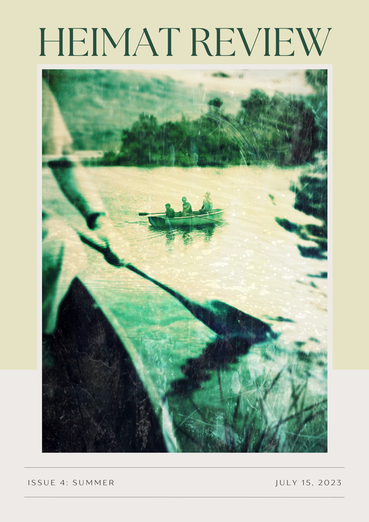Scampton
By Dominic Rivron
July 15, 2023
July 15, 2023
|
1.
You wander into a wheat field. You're so small, the wheat is taller than you are. You push your way through it. You don't realise it then but things could go very badly: the field is huge and you could go on wandering for hours, never finding a way out. You never feel frightened, though. If anything, it feels like an adventure. Fortunately, after a few minutes, you suddenly step out of the wheat not far from where you'd stepped into it. You turn. To your left, a line of poplar trees. In front of you, the wheat field stretches away for ever. Beyond the field, the sun is setting and the bombers are coming in to land. You can't see the planes from where you stand, so you have every reason to assume (as you do, then, and for a long while after) the sound of the jet engines to be the roar of the red clouds, the sound of the sun, setting. Fortunately, they brought their bombs back with them and never dropped them. 2. You are standing in the lane. The girl next door goes past on a tricycle. She sings she loves you, yeah, yeah, yeah. She isn't moving fast enough through space to cause the Doppler Effect although, in your mind, time pulls the tune about like that. 3. You are running along the edge of a field to the old tree that stands in the corner. The trunk is so wide that, a few feet off the ground, where the branches spread out, there is room for all your friends to sit. The burrs on the trunk make it easy to climb. You climb up and join them. 4. You are standing outside the back door, in the yard. The wind has blown the snow into deep drifts that cover the garden wall. It's all new to you: you assume winters will always be like this. You and your father are making a den, digging a hole in the snow, close by where the wall should be. Together, you cover it with an old, green door. You climb down into the hole and, when you do, the white walls glow. There's nothing to do, so you don't stay there for long. The joy of the den was in the making of it. You are walking to school to learn your tables over the mounds of snow left at the roadside by the snow-plough. As you remember it, you are on your own although there are others behind you and ahead of you, all walking to school. A boy clanks past you on a broken bicycle: the chain-ring won't go all the way and he has to make do with half-turns of the pedals. He's wearing a balaclava and, like you, the sores around his nose are dabbed with Gentian Violet. 5. You are hiding in a ditch from imaginary soldiers. You do not yet realise that, were they real, they'd be out to kill you and what that means. Or that one day all this, like everything else, will come to an end. You and your friend look serious, firing your wooden Tommy guns in their general direction, guns his dad made, each a simulacrum of the gun he took to France, whittled from wood and painted black. (You wonder, now, if it took him back and if, before he handed them over, he fired off a few imaginary rounds at the crows in the trees across the road). 6. You are standing in the kitchen, watching your mum and your aunties buttering bread. They spread it thinly, making it go round. 7. You are sitting in your uncle's car – it's drawn up on the grass. Your uncle's a sailor, his arms all muscles and tattoos. He's working underneath. It's a sports car, the dash all switches, dials, like in an aeroplane. Bombs away! You release the brake: the car rolls down the grass. Somebody shouts. Your uncle, later, stood in the living room, rubbing his sore arm and looking from you, to mum and dad and back again. 8. You find yourself in a strange place surrounded by houses and tower blocks instead of open space. There's just you, your mum and the lady you're both lodging with. She's Dutch, kind, older than your mum. There are children, wandering the streets in gangs, and no bole wide enough to hold them all. They see you coming, take you in. This is no D-Day re-enactment: here's the Wild West, the rules are theirs and you, the enemy you imagined on the far side of the field. A boy in a toy felt Union kepi ushers you at plastic gun-point down an alley to a gibbet where the rope's too real. The others hold your arms and put it round your neck. Before they push you off, a woman comes out, tells them not to be so daft. After that, you stay at home and dream of open spaces. |
|
Dominic Rivron writes mainly short stories and poetry. He also writes reviews. His work has been published in a number of print and online magazines, including The Beatnik Cowboy, International Times, The Milk House, Fragmented Voices and Stride Magazine. He lives in the North of England.
He blogs at https://asithappens55.blogspot.com/ |


